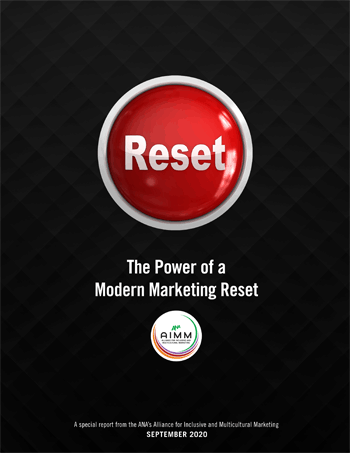 There’s been a great deal of media coverage in the advertising industry of a recent report from the World Federation of Advertisers (WFA) and The Observatory International. With good reason, because in many ways, it doesn’t bode well for external agencies. By Mark Duval – The Duval Partnership
There’s been a great deal of media coverage in the advertising industry of a recent report from the World Federation of Advertisers (WFA) and The Observatory International. With good reason, because in many ways, it doesn’t bode well for external agencies. By Mark Duval – The Duval Partnership
Marketing
What In-house Trends Mean For Your Future New Business
Are You Ready for the New Era of Consumer Data?
![]() The next phase of the data game is upon us. Winning will require a new playbook.
The next phase of the data game is upon us. Winning will require a new playbook.
Brand Intimacy [REPORT]
 A study on how the pandemic is affecting the world’s leading brands.
A study on how the pandemic is affecting the world’s leading brands.
CULTIQUE launches
![]() CIVIC (a Seacrest Global Group Company) announced a new cultural insights and strategy venture – CULTIQUE – a boutique offering that crafts bespoke cultural insights for forward-looking businesses.
CIVIC (a Seacrest Global Group Company) announced a new cultural insights and strategy venture – CULTIQUE – a boutique offering that crafts bespoke cultural insights for forward-looking businesses.
US consumer-packaged-goods advertising in the next normal
 At many US consumer-packaged-goods (CPG) companies business has been turned on its head. Even for companies in categories that experienced rapid growth, the past several months have been dizzying.
At many US consumer-packaged-goods (CPG) companies business has been turned on its head. Even for companies in categories that experienced rapid growth, the past several months have been dizzying.
Why creativity and emotions in advertising matter more than ever
 Slashed budgets, layoffs, mergers and acquisitions, bankruptcy, social and political turmoil – the pandemic is adding additional pressures to the already fast-moving modern media landscape. Amongst this chaos, brands can struggle to develop advertising with appropriate tone and relevant emotional messaging for their audiences. In an environment of heightened tension, connecting with audiences through advertising that showcases creativity and emotional sensitivity may be more important now, than ever before.
Slashed budgets, layoffs, mergers and acquisitions, bankruptcy, social and political turmoil – the pandemic is adding additional pressures to the already fast-moving modern media landscape. Amongst this chaos, brands can struggle to develop advertising with appropriate tone and relevant emotional messaging for their audiences. In an environment of heightened tension, connecting with audiences through advertising that showcases creativity and emotional sensitivity may be more important now, than ever before.
Cross-Media Measurement: Whose Interest is Served?
 In the last few days, egta, the European Association of TV and Radio Sales Houses, published a comprehensive report into advances in hybrid television audience measurement. I don’t pretend to have read it – it runs to 104 pages and is really a source document outlining the options available – but fortunately I know a man who has assured me it is both comprehensive and useful. By Brian Jacobs / The Cog
In the last few days, egta, the European Association of TV and Radio Sales Houses, published a comprehensive report into advances in hybrid television audience measurement. I don’t pretend to have read it – it runs to 104 pages and is really a source document outlining the options available – but fortunately I know a man who has assured me it is both comprehensive and useful. By Brian Jacobs / The Cog
The Power of a Modern Marketing Reset [REPORT]
 This report corroborates the demise of the Total Market approach, a marketing process that short-changed Multicultural & Inclusive Marketing growth, and resetting marketing as we have known it.
This report corroborates the demise of the Total Market approach, a marketing process that short-changed Multicultural & Inclusive Marketing growth, and resetting marketing as we have known it.
Marketing Organization Survey 2020 [REPORT]
 Marketing organizations must adapt to the rapidly changing world. The Gartner Marketing Organization Survey 2020 provides marketing leaders with the latest insights to optimize their organizational structure, transform their existing project management approach using agile marketing practices.
Marketing organizations must adapt to the rapidly changing world. The Gartner Marketing Organization Survey 2020 provides marketing leaders with the latest insights to optimize their organizational structure, transform their existing project management approach using agile marketing practices.
CMOs to agencies: ‘rip up the scope of work’
 Whether it is a sports streaming service or a home goods manufacturer, client businesses have been completely transformed in the past few months. Chief marketers now want, and need, their agency partners to transform with them.
Whether it is a sports streaming service or a home goods manufacturer, client businesses have been completely transformed in the past few months. Chief marketers now want, and need, their agency partners to transform with them.
Celebrating Latina Women: Las Super Shoppers
 Young, diverse, busy, empowered, and family-centered, Latinas are one of the fastest-growing segments among the U.S. population and will represent more than 20% of U.S. women by 2024. They are responsible for more than a trillion dollars of household spend, yet less than 3.6% of U.S. ad spending is invested on them. Are you ready to earn these super shoppers’ business?
Young, diverse, busy, empowered, and family-centered, Latinas are one of the fastest-growing segments among the U.S. population and will represent more than 20% of U.S. women by 2024. They are responsible for more than a trillion dollars of household spend, yet less than 3.6% of U.S. ad spending is invested on them. Are you ready to earn these super shoppers’ business?
U.S. Shoppers Shift Shopping Strategies to Brace for Recessionary Effects
 A much more discerning grocery shopper is emerging in the wake of initial widespread panic-buying sparked by COVID-19 this past spring that led consumers to disregard prices and stock up on products and ingredients required to prepare the entirety of their family meals at home. Retailers and their trading partners responded as rapidly as possible to the sudden spikes in demand by pulling back on promotional efforts and focusing on their supply chains to keep up, which led to higher prices on 64% of more than 500 grocery store categories.
A much more discerning grocery shopper is emerging in the wake of initial widespread panic-buying sparked by COVID-19 this past spring that led consumers to disregard prices and stock up on products and ingredients required to prepare the entirety of their family meals at home. Retailers and their trading partners responded as rapidly as possible to the sudden spikes in demand by pulling back on promotional efforts and focusing on their supply chains to keep up, which led to higher prices on 64% of more than 500 grocery store categories.
Diverse Marketing, Inclusive Message
 Against the backdrop of a global pandemic, economic turmoil, and calls to address racial inequality, brands need to take a meaningful stand.
Against the backdrop of a global pandemic, economic turmoil, and calls to address racial inequality, brands need to take a meaningful stand.
Quit Defunding Your Hispanic Marketing
 At a moment when brands are reflecting on their relationships with multicultural consumers, it’s a great time to talk about something that’s been happening in multicultural marketing for the last decade or so: it’s time to quit defunding your multicultural marketing. What we’ve seen in the Hispanic market, specifically, is that brands have moved to reduce spending under the guise of the Total Market Approach. Granted, we’re all being asked to do more with less. And budget cuts are a part of our reality. But I’m here to show you how to grow your market share and spend your ad dollars more effectively by committing to the Hispanic market. By Pete Lerma, CEO & Co-Founder LERMA
At a moment when brands are reflecting on their relationships with multicultural consumers, it’s a great time to talk about something that’s been happening in multicultural marketing for the last decade or so: it’s time to quit defunding your multicultural marketing. What we’ve seen in the Hispanic market, specifically, is that brands have moved to reduce spending under the guise of the Total Market Approach. Granted, we’re all being asked to do more with less. And budget cuts are a part of our reality. But I’m here to show you how to grow your market share and spend your ad dollars more effectively by committing to the Hispanic market. By Pete Lerma, CEO & Co-Founder LERMA
The ways Hispanics describe their identity vary across immigrant generations
 The terms Hispanics in the United States use to describe themselves can provide a direct look at how they view their identity and how the strength of immigrant ties influences the ways they see themselves.
The terms Hispanics in the United States use to describe themselves can provide a direct look at how they view their identity and how the strength of immigrant ties influences the ways they see themselves.
Language and So Much More
 I often get asked whether brands should use Español or English to reach U.S. Hispanic consumers. The answer is both or a mix, but it’s more complex than just language. Latinos are one of the most diverse minority groups in this country — the market includes some 20 national identities. While we enjoy similar values and traditions, understanding cultural nuances affords brands an authentic connection to us, regardless of language. By Jorge A. Plasencia
I often get asked whether brands should use Español or English to reach U.S. Hispanic consumers. The answer is both or a mix, but it’s more complex than just language. Latinos are one of the most diverse minority groups in this country — the market includes some 20 national identities. While we enjoy similar values and traditions, understanding cultural nuances affords brands an authentic connection to us, regardless of language. By Jorge A. Plasencia
The Minority-Majority Shift. Two Decades That Will Change America. The Surge Of Multiracial Families
 2020 is the year when the majority of all Americans under seventeen years old will be from a minority background, a process that will culminate with a so-called “minority-majority” population by the mid-2040s. These demographic changes will bring about a significant transformation to Corporate America, and during the next few months, I will discuss some of these consequences, in each article targeting one specific area of our business environment. By Isaac Mizrahi – Co-President of ALMA
2020 is the year when the majority of all Americans under seventeen years old will be from a minority background, a process that will culminate with a so-called “minority-majority” population by the mid-2040s. These demographic changes will bring about a significant transformation to Corporate America, and during the next few months, I will discuss some of these consequences, in each article targeting one specific area of our business environment. By Isaac Mizrahi – Co-President of ALMA
Cross-Screen Measurement Isn’t the Future; It’s Already Here
 Once upon a time, TV was linear, with a handful of channels, and the standard unit of measurement was the gross rating point (GRP), which dictated advertising costs and set CPMs. The GRP, the only measurement available, reported on age and gender demographic impressions culled from panels. Brands advertising on television relied on it to place their broadcasting spend accordingly.
Once upon a time, TV was linear, with a handful of channels, and the standard unit of measurement was the gross rating point (GRP), which dictated advertising costs and set CPMs. The GRP, the only measurement available, reported on age and gender demographic impressions culled from panels. Brands advertising on television relied on it to place their broadcasting spend accordingly.
Shaping the Consumer of the Future
![]() Covid-19 has changed the developed markets of Europe and the US more quickly and more dramatically than what would have been imaginable during the early weeks of 2020. It has changed how and where people spend their time, what they think and feel, and it has spurred massive shifts in what people buy and how they buy it.
Covid-19 has changed the developed markets of Europe and the US more quickly and more dramatically than what would have been imaginable during the early weeks of 2020. It has changed how and where people spend their time, what they think and feel, and it has spurred massive shifts in what people buy and how they buy it.
1 Out of 5 Auto Buyers is Latino… Talk about Growth Driver!
 Every night, as 5 full time virtual students/workers get ready to take their car out for a spin, I think the auto industry is really missing the growth of the Hispanic consumer. I did say 5 adults… 4 cars… one house… and during COVID our cars are our escape strategy. By Ana Ceppi
Every night, as 5 full time virtual students/workers get ready to take their car out for a spin, I think the auto industry is really missing the growth of the Hispanic consumer. I did say 5 adults… 4 cars… one house… and during COVID our cars are our escape strategy. By Ana Ceppi



























